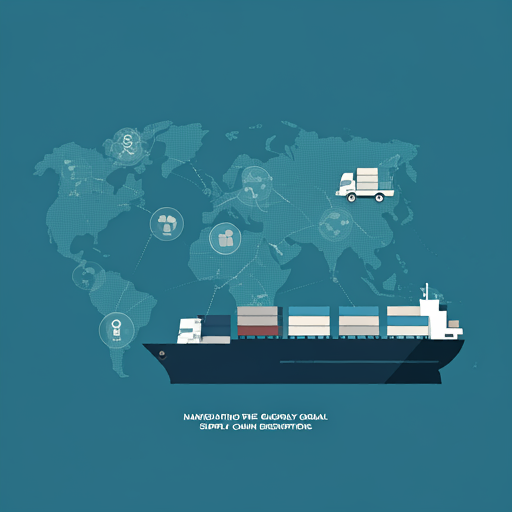Navigating the Global Supply Chain Disruptions
Introduction to Supply Chain Disruptions
Supply chain disruptions have become increasingly prevalent in today’s interconnected economy. He observes that these interruptions can stem from various factors, including geopolitical tensions and natural disasters. Such events can lead to significant delays and increased costs. This is a critical issue for businesses. He notes that understanding these dynamics is essential for effective risk management. Knowledge is power in finance. The integration of advanced technologies can mitigate some of these challenges. Adopting innovative solutions is vital. Ultimately, a proactive approach can enhance resilience in supply chains. This is a strategic necessity.
The Role of Cryptocurrency in Supply Chains
Cryptocurrency offers a transformative potential for supply chains. He recognizes that blockchain technology enhances transparency and traceability. This can significantly reduce fraud and errors. Trust is essential in finance. By facilitating real-time transactions, cryptocurrency can streamline operations. Efficiency is key for profitability. Moreover, it enables cross-border payments with get down fees. Cost reduction is a major advantage. As businesses adopt these innovations, they can better navigate disruptions. Adaptation is crucial in a volatile market.
Understanding Supply Chain Dynamics
Key Components of Supply Chains
Supply chains consist of several key components that work together to deliver products efficiently. He notes that these components include suppliers, manufacturers, distributors, and retailers. Each plays a vital role in the overall process. Understanding their interactions is essential for optimizing performance. Knowledge is crucial in any fisld. Effective communication among these entities can reduce delays and improve service levels. Timeliness is critical for customer satisfaction. Additionally, inventory management is a significant factor in maintaining balance. Proper management prevents stockouts and excess inventory. This is a common challenge in supply chains.
Factors Leading to Disruptions
Several factors contribute to disruptions in supply chains. He identifies geopolitical instability as a significant risk. Such events can lead to unexpected delays and increased costs. This is a critical concern for businesses. Additionally, natural disasters can severely impact logistics and transportation. Preparedness is essential for resilience. Furthermore, fluctuations in demand can create imbalances in inventory levels. This often results in stockouts or excess supply. Understanding these dynamics is vital for effective management. Knowledge is power inward navigating challenges.
The Impact of COVID-19 on Global Supply Chains
Short-term Effects on Supply and Demand
The COVID-19 pandemic has caused significant short-term effects on supply and demand. Key impacts include:
He notes that these factors have led to inventory shortages. This is a pressing issue for many businesses. Additionally, essential goods have seen surges in demand. This creates challenges in meeting customer needs. Understanding these shifts is crucial for strategic planning. Adaptation is necessary in a changing environment.
Long-term Changes in Supply Chain Strategies
The COVID-19 pandemic has prompted long-term changes in supply chain strategies. He observes that companies are increasingly prioritizing resilience. This shift includes diversifying suppliers to mitigate risks. A broader supplier base enhances flexibility. Additionally, businesses are investing in technology for better visibility. Improved tracking systems can streamline operations. Furthermore, many organizations are adopting just-in-case inventory models. This contrasts with the traditional just-in-time approach. Such strategies aim to buffer against future disruptions. Adaptation is essential for long-term success.
Cryptocurrency as a Solution
Enhancing Transparency and Traceability
Cryptocurrency can significantly enhance transparency and traceability in supply chains. He notes that blockchain technology provides immutable records of transactions. This ensures data integrity and reduces fraud. Trust is essential in any transaction. By utilizing smart contracts, businesses can automate compliance and verification processes. Automation increases efficiency and reduces human error. Furthermore, real-time tracking of goods becomes feasible with cryptocurrency solutions. This visibility allows for better decision-making. Knowledge is power in supply chain management.
Facilitating Faster Transactions
Cryptocurrency facilitates faster transactions across supply chains. He explains that traditional banking systems often involve delays. These delays can hinder opsrational efficiency. Speed is crucial in today’s market. By utilizing cryptocurrency, businesses can execute transactions in real-time. This immediacy enhances cash flow management. Additionally, cross-border payments become more efficient and cost-effective. Lower fees are a significant advantage. As a result, companies can allocate resources more effectively. Strategic financial management is essential for growth.
Case Studies of Cryptocurrency in Supply Chains
Successful Implementations
Several companies have successfully implemented cryptocurrency in their supply chains. For instance, a major food distributor utilized blockchain to enhance traceability. This initiative improved food safety and reduced waste. Transparency is vital in food supply. Another example includes a logistics firm that adopted cryptocurrency for cross-border payments. This reduced transaction times significantly. Speed is essential for competitiveness. These case studies demonstrate the potential of cryptocurrency to optimize operations. Efficiency leads to cost savings.
Lessons Learned from Failures
Several case studies highlight lessons learned from failures in cryptocurrency implementations. He notes that inadequate planning often led to project setbacks. This is a common issue in new technologies. For example, a retail company faced integration challenges with existing systems. Compatibility is crucial for success. Additionally, some firms underestimated regulatory compliance requirements. This oversight resulted in costly penalties. Awareness of regulations is essential. These experiences emphasize the importance of thorough research and strategic planning. Knowledge is key to avoiding pitfalls.
The Future of Supply Chains and Cryptocurrency
Emerging Trends and Technologies
Emerging trends indicate a significant shift in supply chains through cryptocurrency integration. He observes that artificial intelligence is increasingly being used to optimize logistics. This technology enhances decision-making processes. Additionally, decentralized finance
Predictions for the Next Decade
In the next decade, cryptocurrency will likely reshape supply chains significantly. He predicts that more companies will adopt blockchain for transparency. This will enhance trust among stakeholders. Additionally, smart contracts will automate various processes. Automation increases efficiency and reduces costs. Furthermore, the integration of AI will optimize inventory management. This technology improves decision-making capabilities. As a result, businesses will become more agile and responsive. Agility is crucial in today’s market. Overall, these advancements will drive innovation and competitiveness. Change is inevitable in finance.
